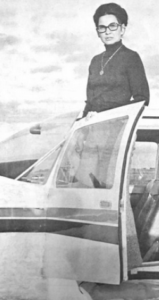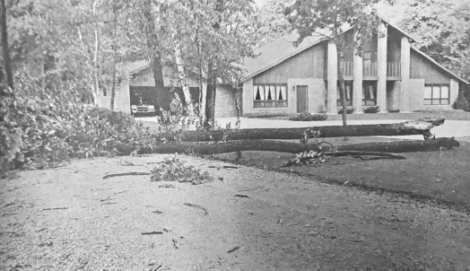Loretta Lynn to sing at Brown County Fair

The cover personality of the current of Newsweek Magazine, Loretta has been signed to appear at the County Fair’s country western spectacular.
The announcement Saturday was scheduled to tie-in with the fair’s computerized ticket sales which went into the mail Saturday. Coincidentally, Newsweek featured the country singer who last year was acclaimed as the Entertainer of the year and the Female Artist of the Year by the country music trade.
The coveted Entertainer of the Year award covers both the male and female artists and is the most sought-after award in the country music business.
The signing of Loretta Lynn marks the third consecutive really big name star to appear here. She follows such major names as Sonny James, Tammy Wynette and George Jones. The Tammy Wynette-George Jones show last year was the biggest of any fair in Minnesota.
Because the Brown County fair has gone major league in talent, previous ticket buyers each year have first opportunity to purchase tickets.
That offer went to the mailing list Saturday and will be processed before new orders are accepted.
Individuals not receiving the letter within the next day or two may write: Country Western, Box 221, New Ulm, Mn. 56073 to receive a ticket order blank.
The show is scheduled Saturday, Aug. 18.
The spread in Newsweek talks about the big interest in country music and is headlined; “Lookin’ at Country with Loretta Lynn”.
The article, as it pertains to Loretta followed:
The old-fashioned traffic light on the studio wall flashed from green to red, throwing eerie shadows across the large, darkened room. Behind a podium that dwarfed her little-girl’s body, Loretta Lynn leaned forward and tilted her chin toward the overhanging microphone. For an instant the light caught her face in a way no album cover could: the fine high cheekbones and sparkling blue eyes, the scrubbed and spirited country beauty tempered by the lines of exhaustion that betray her fragile health. Then the lead guitarist’s tapping foot guided the sidemen into a song and Loretta’s face slipped back into shadow as she began to sing.
“Love …” The sound was rich and strong, and the pickers’ chords blended perfectly behind it as Loretta held it high, then continued, “is the foundation…” It was long after midnight and the tired group had already tried to cut the record several times, but this time every musician in the room knew – with the special instinct of the Nashville professionals – that it was right. It would be not only good, but outstanding enough to stand as Loretta’s next single release. And that meant that it would be a hit, because Loretta Lynn never records a single hit.
Building toward the climax, Loretta’s voice vibrated with excitement. She filled the song to bursting with warmth and sensuality, and near the end she was reaching out, fondling each word as if reluctant to let go:
When he gives me more lovin’
Than a lifetime of lookin’
Could ever find.
The light flashed back to green and Loretta relaxed, a simple, giggling country girl again. “Sounds good enough for the boys I go out with,” she joked. Then she turned to a visitor and added, “You see? I can sing all kinds of songs.”
It could have been a message from the entire country-music industry – and a good explanation of the current explosion in the popularity of the music. Within its framework of simple chords and strong, straightforward lyrics, the country style offers many kinds of sounds and talents, ranging from the poignant laments of Tammy Wynette to the raw sexuality of Jody Miller, from the pure bluegrass sound of Bill Monroe to the electricity of Cajun fiddler Doug Kershaw. And more and more listeners, in cities as well as in the roadhouses and high-school gyms where country has always flourished are finding something in the music that they want.
Well, I was born a coal miner’s daughter
In a cabin on a hill in Butcher Holler…
Butcher Hollow, Ky., has been all but deserted since the Van Lear Mines closed more than two decades ago; only a handful of blank-faced mountain folk remain, existing on food stamps and home-brewed beer. Once, however, the mountainside was home to scores of men who dug coal by night and scraped crops out of the unyielding land by day; and the uppermost cabin was alive with the cries of Ted and Clara Webb’s eight children. The walls were papered with mail-order catalogs and movie magazines, a black snake occasionally crept up between the cracks in the floor, and the family ate bread and gravy while awaiting the rare meals of the only meat they knew – bologna, or “coal-miner’s steak.”
Loretta Webb was 13 when Mooney Lynn married her and took her out of Butcher Hollow. But it wasn’t easy to leave. In fact, one of Loretta’s uncles adamantly refused to let the couple go on their honeymoon until Mooney finally pacified him with a pint of Fat Messer’s moonshine, the finest in the mountains.
++
LORETTA LYNN can’t read well enough to pass the written test for a driver’s license, and her syntax and pronunciation of subjects of frequent jokes among her friends. (“Every time folks start tryin’ to fix up my talkin’,” she moans, “it just messes up my singin’.”) But Loretta learned something up in that bleak hollow that few entertainers ever acquire: an indomitable strength and warmth that she transmits in every word – tender or funny, plaintive or defiant – that she sings. Others may be more polished or complex, but to her fans Loretta Lynn is the quintessential country girl.
A mother at 14 and grandmother at 28, Loretta has survived the hard times by washing other people’s clothes and picking strawberries with migrant workers in the state of Washington. Now she and Mooney own an entire Tennessee village, a Mexican retreat and a handsome income that is virtually guaranteed by her in-credibly loyal fans – but their style of living has changed little. Once they toured the country in a beat-up old Ford to plug Loretta’s first record. Now they travel in a luxurious bus, trimmed with velvet and manned by their fine band and their talented 19-year-old protege, Kenny Starr.
But the force behind them remains the same. Despite her fortune and delicate health, Loretta can’t stop reaching out for the simple country people she knows best. “Sometimes she worries the hell out of me,” admits Mooney, who has fretted through her three operations for benign breast tumors during the past year. “But you can’t say a word that will get her to slow down. This is the only thing she knows – giving herself to these people.”
In. the midst of one recent tour – five one-night stands, 2,000 miles of driving-the bus rolled through the scarred hills between engagements in Clarksburg,W. Va., and Johns Creek, Ky., near her homeland, Mooney called Loretta to look out the fly-specked windshield. “We’ll be passing Chandler’s Cabins,”‘ he said. “Our honeymoon spot.”
“That was a scary time,” Loretta recalled. “I thought that from the holler down to the mine was the whole world. Going up the road to those cabins was like going to the moon. For three days I wouldn’t even show myself in the restaurant there. I kept saying,’Mooney, all the people will know what we been doing’.”
Loretta was indeed naive when Mooney met her. He bought one of her pies at a schoolhouse supper; she had added salt instead of sugar to the recipe, but Mooney smiled through it all and they began “sparkin’.” When Mooney suggested marriage, however, father Ted Webb and his clan were less than enthusiastic. “One of my grandpas was an Indian,” Loretta said,”and he never did talk. The first time I heard him say a whole sentence was after Mooney proposed to me.” “What he said,” added Mooney, “was, ‘You take care of my little girl or I’ll come and kill you’.”
Loretta had four babies in her first four years of marriage; she now has two more at home, the 8-year-old twins Patsy and Peggy. But when she wasn’t laboring in her house or field, she found time to learn to write songs. Soon she had a record – and Mooney had a firm determination to make her a star. “We drove 80,000 miles to sell 50,000 copies of ‘I’m a Honkytonk Girl’,” said Mooney. The effort paid off – soon Loretta was in Nashville, trying on her first high heels and belting out her tunes on television.
++
THROUGH the years, Loretta has merged several fascinating qualities into a unique personality. Her band members call her Mom, and she does project the generous, reassuring manner of a frontier earth mother; yet a simmering sexuality quivers just beneath the surface of many of her best songs. While her booming business empire includes a rodeo, a chain of Western-wear stores and other enterprises, she retains her aura of shy simplicity. And her thoughts on people and life in America would surprise outsiders who assume that all Nashville is papered with George Wallace bumper stickers.
“FDR must have been the best President,” she said flatly, “because he gave Daddy a job when the mine closed. As for blacks, the white folks brought them over here, so we better look out to see they’re treated right.” Warming up to some good-natured baiting by her band members, she reached her favorite subject: The white man came over here and said, ‘Look here, a new country.’ Well, it wasn’t no new country. It belonged to the Indians – and it was taken away from them. So I don’t blame them for acting up at Wounded Knee.” Loretta paused, perhaps a bit surprised at her own speech-making, then summed up her philosophy in characteristic fashion: “I ain’t never seen an ugly Indian.”
When the bus reached the high-school gym, some 4,000 of Loretta’s people awaited her. Then she was on the stage, radiant in a white dress, and the magic she had poured into the 16-track studio tapes a few nights before was exploding across the crowded wooden basketball bleachers. Teen-agers rushed to the foot of the stage to snap her with their Instamatics; the older fans alternately clapped with the rhythm and smiled joyfully as Loretta moved them, surprised them – and gave them memories that would enliven months of rugged Kentucky living. When it ended she would virtually collapse, spent from the strain she was putting on herself. But as she sang she seemed oblivious to pain or exhaustion and, as she carried toward the climax, the spirit in her voice reached all the way back to the cabin where her special country style was born:
Well, a lot of things have changed since way back then,
And it’s so good to be back home again,
Not much left but the floor,
Nothin’ lives here anymore,
Except the memories of a coal miner’s daughter.
-PETE AXTHELM


